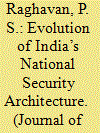|
|
|
Sort Order |
|
|
|
Items / Page
|
|
|
|
|
|
|
| Srl | Item |
| 1 |
ID:
169479


|
|
|
|
|
| Summary/Abstract |
The Kargil War of 1999 focussed the nation’s attention on shortcomings in India’s national security management system, which was largely inherited from the British in 1947. A comprehensive review resulted in a major overhaul, ensuring tighter coordination between the various security structures, reforming the higher defence organisation, and bringing in a holistic approach, recognising the political, economic, technological, ecological and sociological factors impacting on national security. A set of reviews in 2017-18 resulted in further structural reform, taking cognizance of the global geopolitical flux, a revolution in the nature of military conflict, the transformative role of technology in every aspect of internal and external security, and the challenges arising from India’s strategic ambitions. The reformed and new structures emerging from these reviews are still a work in progress. Their functioning as a smooth, well-oiled national security machinery would require a coordinated, all-of-government approach.
|
|
|
|
|
|
|
|
|
|
|
|
|
|
|
|
| 2 |
ID:
191971


|
|
|
|
|
| Summary/Abstract |
The multilateralism that emerged from the World War, as a framework of international
governance, was marked by universal membership of a variety of multilateral bodies
and arrangements, including the United Nations, its organs and agencies, the Bretton
Woods institutions (the World Bank, International Monetary Fund and others),
international treaties and conventions. It is, for the most part, a system created, interpreted
and administered by developed countries, or, more specifically, the victors of the World
War. Multilateralism sought to address global political, economic and security challenges,
with the more powerful countries keeping some sort of check on each other and
exercising some control over the behaviour of smaller countries, while giving them
also a voice and influence that they could not otherwise exercise. The Non-Aligned
Movement espoused the Lilliputian strategy of small countries banding together to
collectively influence larger ones and secure a measure of autonomy of policy.
|
|
|
|
|
|
|
|
|
|
|
|
|
|
|
|
|
|
|
|
|